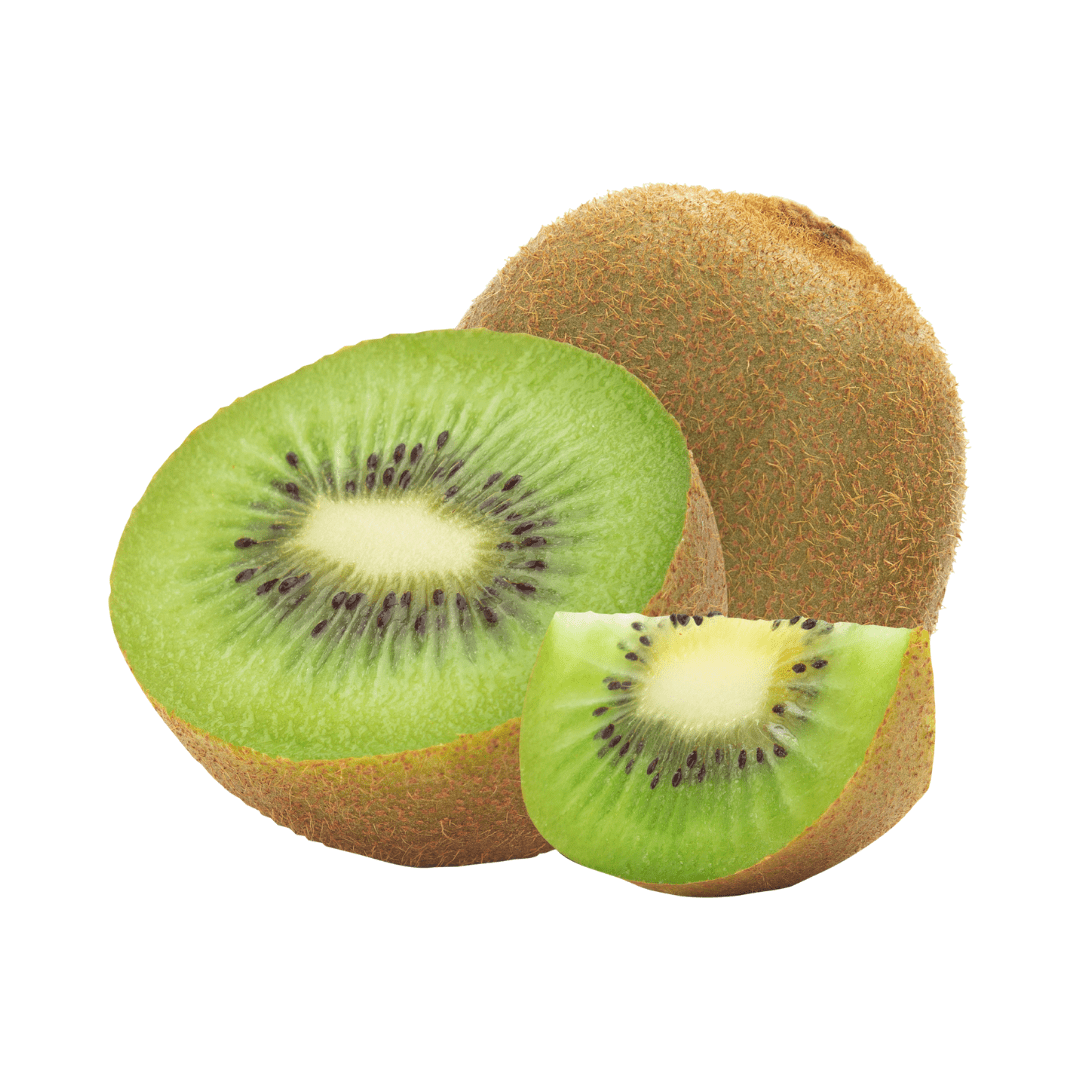About
Kiwi is a small oval-shaped fruit, typically brownish in color, with fuzzy brown skin and green flesh inside. It is native to China but is now widely grown in many countries, including New Zealand, where it gets its name.
Health Benefits of Kiwi:
-
Rich in Vitamin C: Kiwi is an excellent source of vitamin C, which is important for the immune system, wound healing, and collagen synthesis.
-
High in Fiber: Kiwi contains both soluble and insoluble fiber, which can promote digestive health, reduce cholesterol levels, and prevent constipation.
-
Good for Heart Health: The potassium and fiber in Kiwi can help lower blood pressure, reduce the risk of heart disease, and improve cardiovascular health.
-
Antioxidant Properties: Kiwi is rich in antioxidants, such as vitamin C, vitamin E, and flavonoids, which can help protect against oxidative stress and reduce the risk of chronic diseases.
-
Promotes Healthy Skin: The vitamin C and vitamin E in kiwi can help promote healthy skin by reducing the appearance of wrinkles and improving skin texture.
Diseases that can be cured:
Kiwi has been shown to have potential health benefits in the following areas:
-
Asthma: Some studies suggest that kiwi may help improve lung function in people with asthma.
-
Digestive Health: Kiwi may help promote digestive health by reducing constipation and improving overall gut health.
-
Cardiovascular Health: Kiwi may help reduce the risk of heart disease by improving blood pressure and cholesterol levels.
-
Immune System: Kiwi is rich in vitamin C, which can help boost the immune system and reduce the risk of infections.
Energy content per serving (50g): 27 calories
Macronutrient Content (per serving of 50g)
| Nutrient | Amount |
|---|---|
| Carbohydrates | 6.2g |
| Fats | 0.2g |
| Proteins | 0.6g |
| Fiber | 1.3g |
| Water | 42.2g |
Vitamin Content (per serving of 50g)
| Vitamin | Amount |
|---|---|
| Vitamin A | 12.5 mcg |
| Vitamin B1 (Thiamin) | 0.01mg |
| Vitamin B2 (Riboflavin) | 0.03mg |
| Vitamin B3 (Niacin) | 0.18mg |
| Vitamin B6 | 0.04mg |
| Vitamin B12 | 0.0mcg |
| Vitamin C | 44.3mg |
| Vitamin D | 0.0mcg |
| Vitamin E | 0.29mg |
| Vitamin K | 25.2mcg |
| Folate | 14.6mcg |
| Biotin | 1.5mcg |
Mineral Content (per serving of 50g)
| Mineral | Amount |
|---|---|
| Calcium | 20.5mg |
| Iron | 0.2mg |
| Iodine | 1.3mcg |
| Zinc | 0.2mg |
| Magnesium | 10.7mg |
| Phosphorus | 23.5mg |
| Potassium | 131.5mg |
| Sodium | 1.0mg |
| Chloride | 13.0mg |
| Copper | 0.09mg |
| Chromium | 0.0mcg |
| Fluoride | 4.6mcg |
| Molybdenum | 1.1mcg |
| Manganese | 0. |
What is Kiwi, and where is it originally from?
Kiwi is a small oval-shaped fruit with brownish fuzzy skin and green flesh inside. It is native to China but is widely grown in countries like New Zealand.
What are the health benefits of Kiwi?
Kiwi is rich in vitamin C, fiber, and antioxidants, which contribute to immune support, digestive health, heart health, and healthy skin.
How does Kiwi help promote heart health?
The potassium and fiber in Kiwi can help lower blood pressure and reduce the risk of heart disease.
Can Kiwi promote healthy skin?
Yes, the vitamin C and vitamin E in Kiwi can improve skin texture and reduce the appearance of wrinkles.
What diseases can Kiwi potentially help cure or manage?
Kiwi may have potential benefits for asthma, digestive health, cardiovascular health, and the immune system.
How many calories are there in a serving of Kiwi?
A 50g serving of Kiwi contains approximately 27 calories.
What vitamins are found in Kiwi?
Kiwi is a good source of vitamin C, vitamin A, vitamin K, vitamin E, vitamin B1, vitamin B2, vitamin B3, vitamin B6, and folate.
How does Kiwi support the immune system?
Kiwi's high vitamin C content helps boost the immune system and reduces the risk of infections.
Is Kiwi beneficial for digestive health?
Yes, Kiwi contains both soluble and insoluble fiber, which promotes digestive health and reduces constipation.
How can Kiwi be helpful for asthma patients?
Some studies suggest that Kiwi may help improve lung function in people with asthma.
What minerals are present in Kiwi?
Kiwi contains minerals such as calcium, iron, iodine, zinc, magnesium, phosphorus, potassium, sodium, copper, chromium, fluoride, molybdenum, and manganese.
How does Kiwi contribute to reducing cholesterol levels?
The soluble fiber in Kiwi can help reduce cholesterol levels, promoting heart health.
Can Kiwi help in weight management?
Kiwi's low calorie and high fiber content make it a suitable addition to a weight management plan.
How can Kiwi be incorporated into the diet?
Kiwi can be eaten fresh, added to smoothies, salads, desserts, or used as a garnish for various dishes.
Is Kiwi suitable for those with heart conditions?
The potassium content in Kiwi can be beneficial for heart health, but it's best to consult a healthcare professional for personalized advice.
Are there any special Kiwi-themed events or festivals?
Some regions may host Kiwi-themed events or festivals celebrating the fruit.
Can Kiwi be used in skincare products?
Kiwi's vitamin C and vitamin E content can be found in skincare products for their potential benefits.
How to select and store Kiwi properly?
Choose ripe Kiwi with firm skin, and store them at room temperature until they ripen or in the refrigerator for extended freshness.
How to incorporate Kiwi into a balanced diet for children?
Kiwi can be sliced and served as a nutritious snack or blended into smoothies for children to enjoy.









